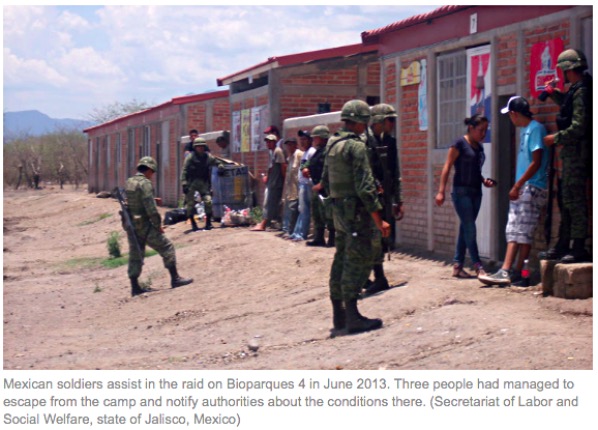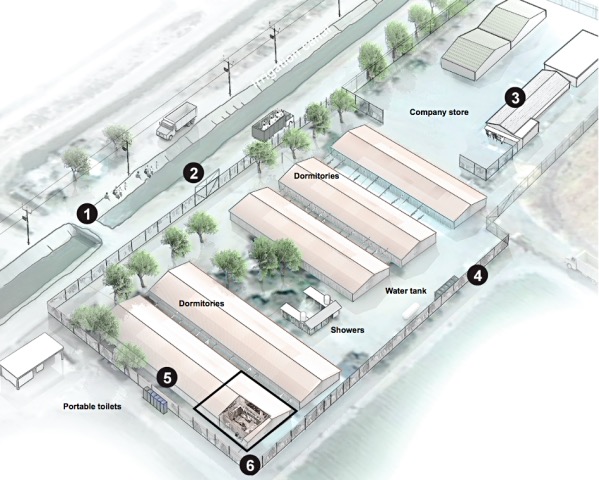[hupso title=”They treated us like slaves… 2nd installment of @latimes investigative report on devastating conditions in #Mexican tomato industry ” url=”https://ciw-online.org/blog/2014/12/latimes-2/”]
Devastating tale of criminal brutality and cruel indifference at one labor camp in Mexico’s tomato industry is a case study in the abject failure of the traditional model of Corporate Social Responsibility
First things first. If you haven’t done so already, put aside whatever else you might be doing at the moment and go read the full second installment of the explosive four-part investigative series in the LA Times entitled “A Product of Mexico: Hardship on Mexican Farms, a Bounty on US Tables”. Take your time and read it thoroughly, the power is in the details. Here are just a few:
“The compound was fenced with barbed wire and patrolled by bosses on all-terrain vehicles.”
“You’re trying to leave,” he said, after spotting a change of clothing in a plastic bag Martinez was carrying.
“I’m just going for a walk,” Martinez said.
“Get in the car or I’ll break you,” the boss replied.
One day, a mother confronted a boss. She asked for more tortillas. Ricardo Martinez, who was standing in the soup line behind the woman, recalled the boss’ reaction.
“He told her she would only get a slap in the face,” Martinez said. “Then an older man stepped in and said, ‘Don’t hit her, hit me.’ “
Martinez said the boss knocked the man to the ground and beat him. “She just needed more for her kids. What they gave wasn’t enough,” Martinez said.
Workers would hatch escape plots as desperation gripped the camp… Two young women spotted by a company guard just outside the front gate were dragged back inside. A boss had each one by the collar. They hung their heads, Guillermo Martinez said.
“I just want to go home,” he recalled one woman crying out.
Bosses threw the women’s backpacks in a storage room filled with confiscated belongings. They routinely took escapees’ shoes and docked them three days’ pay.

On June 10, 2013, three people managed to escape. They hitchhiked 100 miles to Guadalajara, where they notified authorities. The next day, dozens of state and federal officials arrived at Bioparques.
Ricardo Martinez, who had resorted to rummaging through garbage cans for food, broke down when he saw police and soldiers pouring through the gates.
“To tell you the truth, I cried…. Everybody there was really sick,” he said. “They treated us like slaves.”
Two hundred seventy-five people had been trapped in the camp, including two dozen malnourished children.
At least one man had been tied to a tree and beaten by camp bosses, said Juan Ramirez Arrona, a director general of the state of Jalisco’s Secretariat of Labor and Social Welfare.
“They were totally captive, prisoners,” Ramirez said in an interview.
It goes on, and on, a graphic story of unbridled power, greed, and inhumanity.
But perhaps the single most devastating line in the entire piece is this:
A year and a half later, however, the case of Bioparques speaks more to the impunity of Mexican agribusiness than to accountability.
Slavery in our supermarket aisles
While the details of the Bioparques case may seem so harsh, so extreme, as to be part of another place or time altogether from our daily lives here in the US, the story of how the tomatoes picked at Bioparques got to market — US markets — is even more disturbing. In fact, it is entirely possible that you ate tomatoes picked by the workers whose story is told in this second installment of the LA Times report.
Richard Marosi, the reporter behind this outstanding investigation, traced the tomatoes picked at Bioparques to three supermarket giants, where they were sold under the Kaliroy brand: Walmart, Safeway, and Albertsons. And what did those companies have to say when the LA Times confronted them with its findings? From the Times story:
Wal-Mart says it stopped buying produce from Bioparques after the raid. Spokeswoman Jo Newbould said the action was based on Wal-Mart’s own inquiry into labor conditions at the farm, an independent audit and the Mexican government’s investigation.
Albertsons declined to comment.
Safeway said in a statement that it takes “any and all claims regarding worker conditions seriously” and was looking into the alleged abuses.
And how did such an abject failure of social responsibility come to pass at three such powerful companies, companies that regularly demand that their suppliers meet their specifications for size, shape, and quality or lose their business if they don’t? It came to pass, quite frankly, because no one who was in a position to stop the abuses at Bioparques — including, and perhaps especially, the brands — cared enough to do so.
Of the three, Walmart’s answer comes closest to a satisfactory response, although their decision to cut off purchases only came in reaction to the raid and arrests and gives no indication of any kind of program ever having been in place to detect and prevent the abuses in the first place. Safeway’s response is public relations boilerplate, a stock response taken from a well-worn playbook. And Albertsons didn’t even care enough to answer.
There is an answer, however, that can end the abuse…
The unfolding story coming out of Mexico’s tomato fields is beyond distressing. It confirms all the worst suspicions of anyone who ever wondered if Corporate Social Responsibility (CSR) was really only public relations by other means, a way to deflect public scrutiny rather than prevent human rights violations.
But there is another way, and readers of this site will be familiar with what the CIW calls “Worker-driven Social Responsibility,” or WSR, to distinguish it from the traditional CSR model.
We have written about WSR before (“Worker-driven Social Responsibility (WSR): A new idea for a new century”), but in light of the horrific new case study of the CSR model provided by the LA Times investigation, it seems that a return to the theme, and a fresh comparison with the CSR model, is once again in order.
That analysis will come next week, once the entire series has run its course. For now we leave you with this remarkable graphic, below, courtesy of the LA Times, that provides some sense, however distant, of the humiliating conditions faced by those who break their backs harvesting tomatoes so that we can have fresh, vine ripe fruit in our supermarkets and restaurants. Click anywhere on the image to go to the LA Times page where you can see it, and an accompanying detail, in a larger format.
Think of it next time you buy a tomato, and then think about what you can do to help.

